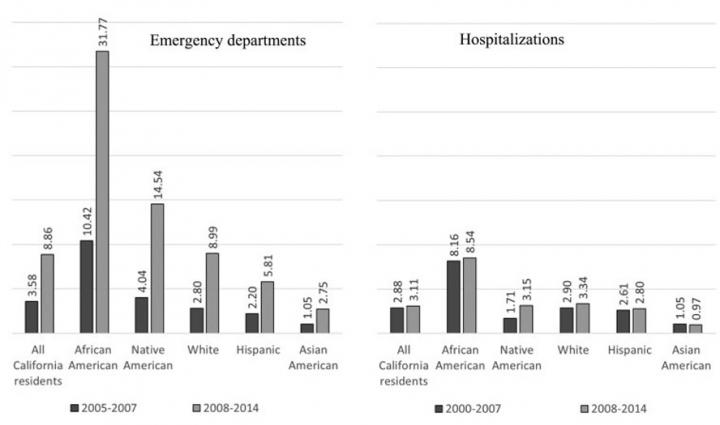UC Davis study suggests preparing for similar issues in COVID-19

Credit: Courtesy of Study Researchers
Emergency room visits for domestic violence incidents in California more than tripled during the Great Recession compared to the years before, signaling a need to prepare for similar and more prolonged effects during the COVID-19 financial crisis, suggest University of California, Davis, researchers.
Conducting one of the first studies to date examining the impact of a modern recession on hospital and emergency room visits, researchers found that physical abuse in adults increased substantially between the time periods, with Black and Native American people being disproportionately affected. Violence against children did not show a marked increase. The results were published in Preventive Medicine in June.
“The results from our study shine a spotlight on the importance of domestic-violence-related screening, prevention and response during the next several months of the COVID-19 financial effects,” said the study’s primary author, Alvaro Medel-Herrero, project scientist for the UC Davis Center for Health and the Environment. “Notably, domestic violence is grossly under-reported, and cases that end up in the emergency room or result in a hospital stay are only the most egregious examples. This tells us there may be an even larger problem than the numbers can show.”
The study’s co-authors included Suzette Smiley-Jewel, of the UC Davis School of Veterinary Medicine; Martha Shumway, Department of Psychiatry, University of California, San Francisco; Amy Bonomi, Michigan State University; and Dennis Reidy, School of Public Health, Georgia State University.
Study looked at 53,000 domestic violence episodes
The study’s authors looked at more than 53,000 domestic-violence-related episodes, composed of both intimate partner violence as well as violence against elders and children, between 2000 and 2015. The numbers were drawn from California’s Office of Statewide Health Planning and Development, or OSHPD, and then broken down between the years during, before and after the Great Recession. While the Great Recession officially lasted less than two years, from December 2007 to June 2009, during which the gross domestic product contracted, the economic crisis produced long-lasting consequences for individuals as well as society as a whole, researchers said.
“Proactive outreach is especially needed for minoritized people, who may be especially isolated, experiencing disconnections from services, and facing extreme financial stress,” said one of the co-authors, Bonomi, of Michigan State University.
Blacks more than three times more likely to be victims
Time series for the study were divided into pre-recession (January 2000-November 2007) and recession/post-recession (December 2007-September 2015) periods. Blacks were more than three times more likely to suffer domestic violence during the recessionary period when compared with other segments of the California population, according to the data. Statistics showed that there were 3.58 emergency room visits per 100,000 population compared to 10.42 emergency visits per 100,000 people for Blacks. Hospitalization rates remained relatively similar from the pre-recession as compared to the recession/post-recession period except for Native Americans, which nearly doubled.
Emergency visits vastly exceeded hospitalizations during the 2007-2015 time period.
Additionally, the number of California police calls for weapon-involved domestic violence episodes steadily increased from 2008 (65,219) to 2014 (75,102).
Costs associated with domestic violence
For the period analyzed (2000-2015), the estimated total charge for all analyzed domestic violence hospitalizations was more than $1 billion (data was not available for emergency department costs).
Length of hospital stays slightly increased during the recession/post-recession period as compared to the pre-recession period, yet the inflation-adjusted charge per hospitalization dramatically increased over time, according to the study.
Domestic violence rate does not correspond with other hospital visits
It is important to note that the described increase in domestic-violence-related hospitalizations during the recession does not correspond to a general trend in health care in California. For example, California cancer hospital rates dropped during the Great Recession, according to OSHPD data. However, an increasing demand for emergency care during the recession and post-recession period has been reported and may reflect limitations in accessing care in other parts of the health care system, researchers said.
The authors’ research will continue.
###
The research was supported by a UC Davis Feminist Research Institute seed grant.
Full study available: https:/
Media Contact
Karen Nikos-Rose
[email protected]
Original Source
https:/
Related Journal Article
http://dx.




